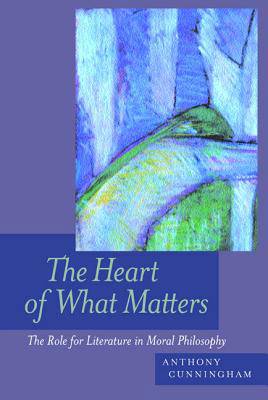
- Afhalen na 1 uur in een winkel met voorraad
- Gratis thuislevering in België vanaf € 30
- Ruim aanbod met 7 miljoen producten
- Afhalen na 1 uur in een winkel met voorraad
- Gratis thuislevering in België vanaf € 30
- Ruim aanbod met 7 miljoen producten
Zoeken
The Heart of What Matters
The Role for Literature in Moral Philosophy
Anthony Cunningham
Paperback | Engels
€ 57,95
+ 115 punten
Omschrijving
The Heart of What Matters shows that literature has a powerful and unique role to play in understanding life's deepest ethical problems. Anthony Cunningham provides a rigorous critique of Kantian ethics, which has enjoyed a preeminent place in moral philosophy in the United States, arguing that it does not do justice to the reality of our lives. He demonstrates how fine literature can play an important role in honing our capacity to see clearly and choose wisely as he develops a moral philosophy that engages with our intimate emotional concerns. Written in an accessible style and drawing from a provocative body of contemporary literature, this book shows how moral philosophy can reach a far wider audience than it has.
In part one of this book, Cunningham sketches out the theoretical basis for a redefined conception of moral philosophy. In part two, he engages in extended analyses of novels that address significant life and character issues, specifically Kazuo Ishiguro's The Remains of the Day, Toni Morrison's Beloved, and Zora Neale Hurston's Their Eyes Were Watching God and Seraph on the Suwanee. Cunningham shows exactly how works like these can inform moral philosophy. Drawing from film, history, psychology, and other social sciences in addition to literature, this book adds to the growing number of works that use literature for ethical analysis and to the growing controversy over Kantian ethics.
In part one of this book, Cunningham sketches out the theoretical basis for a redefined conception of moral philosophy. In part two, he engages in extended analyses of novels that address significant life and character issues, specifically Kazuo Ishiguro's The Remains of the Day, Toni Morrison's Beloved, and Zora Neale Hurston's Their Eyes Were Watching God and Seraph on the Suwanee. Cunningham shows exactly how works like these can inform moral philosophy. Drawing from film, history, psychology, and other social sciences in addition to literature, this book adds to the growing number of works that use literature for ethical analysis and to the growing controversy over Kantian ethics.
Specificaties
Betrokkenen
- Auteur(s):
- Uitgeverij:
Inhoud
- Aantal bladzijden:
- 306
- Taal:
- Engels
Eigenschappen
- Productcode (EAN):
- 9780520226623
- Verschijningsdatum:
- 11/09/2001
- Uitvoering:
- Paperback
- Formaat:
- Trade paperback (VS)
- Afmetingen:
- 153 mm x 229 mm
- Gewicht:
- 417 g

Alleen bij Standaard Boekhandel
+ 115 punten op je klantenkaart van Standaard Boekhandel
Beoordelingen
We publiceren alleen reviews die voldoen aan de voorwaarden voor reviews. Bekijk onze voorwaarden voor reviews.











